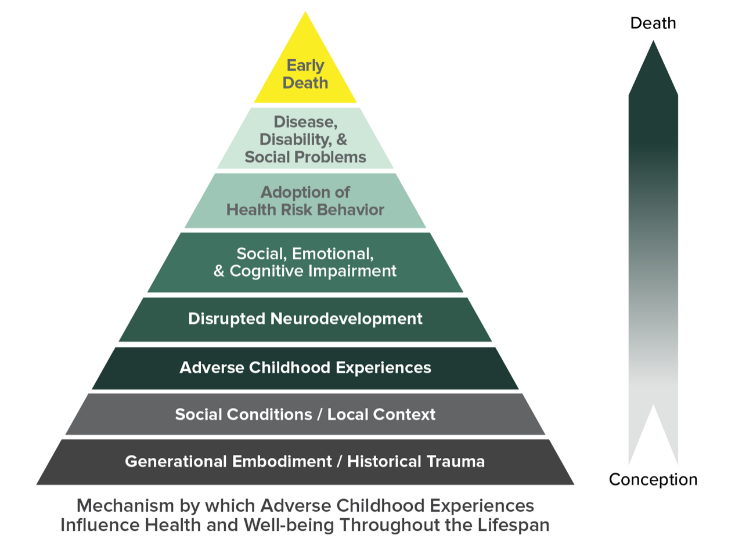
If you’ve lived through traumatic experiences, you may hear the phrase, “It’s not you but what happened to you.” That’s because trauma can impact thoughts, emotions, behaviors and interactions with others. However, the relationship between childhood trauma and health is often overlooked.
October 25, 2023
Approximately 64% of adults in the United States have experienced at least one kind of adverse childhood experience (ACE) before age 18, while nearly 1 in 6 report experiencing four or more, according to the Centers for Disease Control and Prevention. Those who experience four or more adverse experiences during childhood are at significantly higher risk of developing chronic health problems and serious mental illness.
Read about how Penn State Health is helping teachers and others support children who have undergone trauma.
ACEs are potentially traumatic events, like abuse, neglect or exposure to household dysfunction, that can have strong effects on a person’s health. The ACEs Aware initiative has a questionnaire with experiences that correspond to potentially traumatic events, such as:
 Abuse – physical, emotional or sexual
Abuse – physical, emotional or sexual- Neglect – physical or emotional
- Household dysfunction – parent mental illness, incarcerated relative, domestic violence, substance abuse within the home, not being raised by both biological parents
Those completing the ACE questionnaire and indicating four or more of these experiences during childhood tend to have an increased risk of developing long-term health conditions, including heart disease, stroke, cancer, chronic obstructive pulmonary disease, diabetes and Alzheimer’s disease.
What are the risks factors for adverse childhood experiences?
The Centers for Disease Control and Prevention identifies numerous factors that contribute to the risk of an ACE exposure. Some individual and family risk factors include:
- Low income
- Adults with low levels of education
- Children and youth who are socially isolated or with friends who engage in aggressive or delinquent behavior
Community-related risk factors can include:
- High rates of violence and/or crime
- High rates of poverty and limited educational/economic opportunity
- Unstable housing
- Frequent food insecurity
In addition, a study found that some populations have a higher risk of exposure to ACEs, including members of the LGTBQIA+ community and those who identify as female, Black, Hispanic or multiracial.
Adverse childhood trauma is a health equity issue
The risk factors for ACEs involve all five social determinants of health and are more likely to affect marginalized communities. The cycle of childhood trauma and its lifelong effects can create further inequities within populations already experiencing major inequalities. Stressful events may have lasting effects, and exposure to crime and violence in the home significantly influences health across various populations.
Health disparities can also result from biologic responses to trauma that are passed down through genetics (called epigenetics), illustrating the power of environment, the long-term effects of trauma and how traumatic events may make it difficult to manage overall health.
Exposure to childhood trauma, health disparities and social determinants of health are inseparable.
What can we do?
While we cannot control the environments our patients come from or create jobs for them, health care professionals can make a difference. By understanding the impact of childhood trauma, they can improve their approach to patient care.
- For pediatric patients: Screening for ACEs offers an opportunity to connect families with resources they need to reduce certain risk factors.
- For adults: ACE screening can provide insight into past trauma that may be affecting them today.
As a health care organization, Penn State Health is in a unique position to provide care and help address the factors that influence people to seek care. An awareness of ACEs will not solve everything, but it’s a crucial starting point to understand our patients better.
To learn more, check out these resources:
- We Can Prevent ACEs
- How Childhood Trauma Affects Health Across a Lifetime
- Trauma-Informed Care in Pennsylvania Human Service
Learn ways to incorporate ACEs into your workflow from a health equity perspective. Contact Heather Doyle, program director for health equity, at [email protected].
Find out how ACEs can affect the patient experience. Contact Caanen Churukha, program manager for diverse patient experience, at [email protected].
